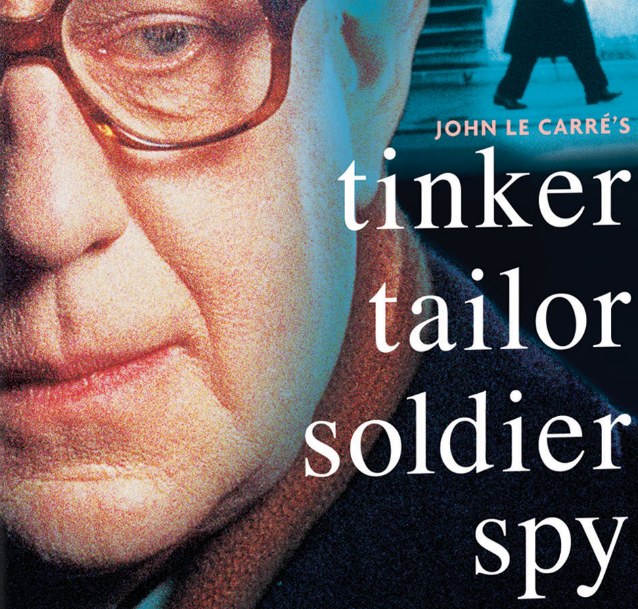Last updated on August 15, 2013
Tinker, Tailor, Soldier, Spy – I have no particular compulsion to watching British dramas; I am merely interested in the subject matter, I swear! Having heard of the recent film’s release, and that it felt relatively unintelligible without a working knowledge of the book in many places, I sought to watch the original BBC production first so that I could point and laugh at the new one. Kidding! In fact, I wanted to watch this nine-hour series due to its fascinating premise.
Based on a novel by John le Carre (a pen name of a real British spy) written during the Cold War, we learn the story of the Circus (in other less spy-like terms, MI5, which became the basis for James Bond’s fake MI6). Britain’s secret service has gotten a Russian mole burrowing deep into its secrets, and there are four primary suspects. Unfortunately, all of them are capable, as per a spy organization, and deceiving them into revealing their secret won’t be easy. He could very well be the head of the whole Circus, or merely a lackey; there could be two or three total, an organization corrupted from its primary leadership positions. In any case, any internal investigation seems completely out of the question; the mole knows we search for him. Also, Ian Richardson of House of Cards is one of the possible moles, except he’s looking much younger in 1979!
Enter George Smiley, our protagonist and dedicated British national. An emotionless and somewhat cold man whose wife isn’t particularly dedicated (nor was he, obviously!), he’s brought out of retirement (early retirement) when the mole-incriminating information emerges. As a retiree, he’s got an obvious advantage by not being in the loop, but he brings all his connections to bear (including other Circus agents and former foes) to sort the mess out and, perhaps, find some dark secrets over the whole thing. As the most nonchalant, impressionless man you will ever meet, Guiness makes Smiley into the perfect spy in both mood and in acting chops. It’s a bizarrely minimalist performance that makes all the sense in the world – he’s no bombastic James Bond, that’s for sure. This is gritty and down-to-earth, a realistic take on what probably goes on in spycraft than a film will tell you.
Unlike his comrades, Smiley (played by Obi-Wan Kenobi…I mean, Alec Guiness) shows a stalwart dedication to the job, and nothing BUT the job. The four moles, on the under hand, show us a creeping cynicism on the part of most other Circus “employees”. They see their positions not in their country’s best interest, but their own need for promotions, ranks, and state budgets. Does this necessarily make them candidates for insider information provided by the Russians? Not necessarily! It makes them harder to spot, surely, if everyone acts the same. This makes Smiley’s unstated (and, I might add, unhired with no pay) job quite difficult. Who wants to work with the other side, and for what reason? With that sort of dour setting, how could you possibly know, and what could they possibly pay, to make that a reality?
This is NOT a show for the light of heart, and I do mean that rather literally. Like a novel, it moves with a forward narrative drive and an exceedingly direct clip that leaves no details unturned and even make seeming incidental details a part of the plot. The constant codename/spy talk also lends the story to confusion. One becomes a bit of a professional cryptographer when deciphering the code of the language used, referring to something but not quite referring to it. The former head of the Circus doesn’t even receive a name! It’s all very confusing, and not paying attention will lead to massive problems.
Furthermore, getting used to late 1970s British acting – or as I would call it, mumbling low-talkers – turns some scenes into a session of “rewind and rewatch” or “where the heck is the subtitle button?!” I exaggerate slightly, but only slightly, when I say great actors of the United Kingdom do not lend themselves to slow sequences of dialogue where everyone speaks in hushed tones, regardless of the quality and depth of performance. Might I note that the show contains barely any action of any kind, resorting to words and long scenes of tension and doublespeak. It’s remarkably effective; having veiled threats thrown at you in a “meeting” versus pointing a gun to someone’s head like a boorish American makes this distinctly British and European. I guess we could say that British people make remarkable spies, in that sense, due to their ability to set up a passive-aggressive facade with the most witty language and barbed verbal attacks possible.
Unfortunately, unlike last week’s House of Cards, this show isn’t available on any streaming service that I could find. You COULD buy it, but I would recommend getting it from Netflix’s disc service; the Blu-ray looks absolutely astounding for such an old show, and the audio simply shines when the need for clarity in a talk-heavy is all important.
As an intensely serious explication of Cold War Spycraft, it’s rather marvelous if completely impenetrable to an audience which even forgets tiny details. I recommend you take notes if you’re not the sort of person who can categorize and memorize names, because you will find yourself COMPLETELY lost if you do not pay attention. It never lets up and never slows down, and even the slow-pacing feels rather fast. Take your time with this one, and you will enjoy it. With that caveat, please go for it and report back; BBC dramas are my thing now, not really.
————————————————————————————————————————————————————————————————————————————
And that’s Monday Update, where apparently I’ve become a critic of television shows and BBC dramas. Maybe I should talk about something else every once and a while?

